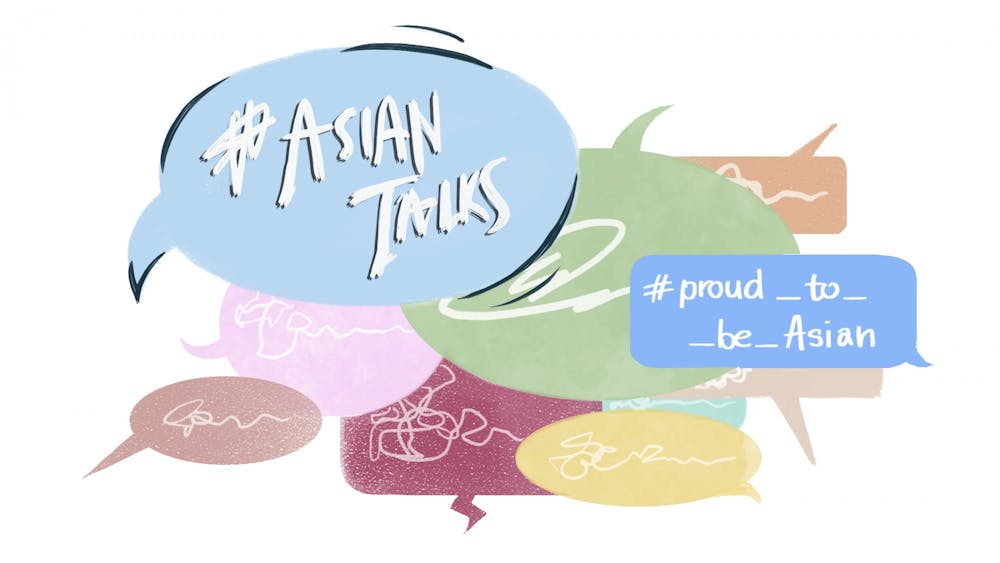Behind the curtain of her hair, Ryan Afreen’s (C ‘23) earrings sparkle. Her hands dance as she describes the events of her past few Friday afternoons. In the basement of PAACH, the Pan–Asian American Community House, she sat down with her Asian peers to facilitate casual discussions of shared and individual experiences.
After the wave of Asian–targeted hate crimes—which increased by 339 percent last year compared to 2020—Ryan looked inward to counteract the hate. As a celebration of her own Asianness and that of her Penn peers, she organized #AsianTalks. At the event, students wrote all the reasons that they are #ProudToBeAsian on whiteboards outside of ARCH. Ryan’s seemingly simple first event turned out to be the perfect way to kickstart her initiative, and its meaningfulness only multiplied.
After a successful turnout, Ryan wanted to figure out how she could do more to build trust and “break down the generational facade” of perfection that she saw in many of her Asian peers. Many Asian–American students do not seek out mental health help, she says, and so the whiteboard event evolved into “Asian Talks,” a weekly discussion space for her peers to turn to and be vulnerable. Populated by both undergraduate and graduate students, the fluctuating group of around 30 people meets to discuss the Asian experience and perspective at Penn.
Ryan develops a prompt each week and incorporates humor as a way to break the ice. She’s intentional with the vagueness of her queries and keeps them timely. One of the first questions she posed at the beginning of the spring semester was, “Are we really happy to be back on campus?” The ensuing discussion bounced from COVID–19 safety concerns, to social relief, to academic gratification, and everywhere in between.
The discussions aren’t downward–spiraling collectives of voices. They are a source of tangible, actionable advice, as well as a psychological safe space where students have the freedom to speak and listen without fear. “It’s not Ryan giving advice like a holy saint,” says frequent participant Divyansh Agrawal (E ‘22).
Ryan’s goal is to have discussions that “teach us how to be vulnerable—something we’ve been taught not to do." Divyansh characterizes the setting as a place with “a lack of judgment but a unity of experience and values.” He had some social issues with friends back in the fall, but was able to turn to the people at Asian Talks who gave him advice as well as a sense of comfort and safety. “Collaboration is really the best part about Asian Talks,” he says. “We’re asking real questions of each other and getting real answers.”
“The program has a selfish purpose,” admits Ryan sheepishly. “Every time I walk in, I get a resurgence of energy.” Ryan was shocked by the initiative's overwhelming positive response, and she has plans for Asian Talks to continue long after she graduates next year. PAACH Director Peter Van Do and PAACH interns will continue to facilitate the program, and Ryan is in communication with CAPS to discuss identity–specific mental health support resources.
Harking back to its foundations, Asian Talks still maintains its celebratory intention. Its active social media presence is an important part of Ryan’s strategy, providing colorful and often humorous graphics to alert the community of upcoming discussion times and prompts.
The meetings provide an atmosphere of complete empathy. Students are met with the expectation to leave their judgements at the door—and there are no talks of internships, job plans, or research opportunities. The discussions deconstruct Penn Face by giving students the opportunity to connect with each other. Divyansh is comforted by the fact that he knows that “at some point, our experiences connect.”
The search for familiarity in experience is powerful, and without programs like AsianTalks, it is a process that can be incredibly daunting and lonely. As we all know, Penn can be a huge source of academic and social stress. For Divyansh, Asian Talks has helped him realize something that he says he’ll carry with him for the rest of his life: “Our Asianness is beautiful.”

